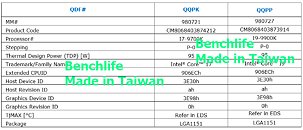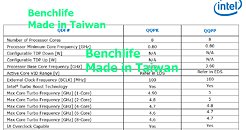Tuesday, August 14th 2018

Finer Details of Intel Core i7-9700K and Core i9-9900K Emerge
Taiwanese tech site BenchLife.info scored finer details of Intel's upcoming premium LGA1151 processors through screenshots of leaked documents; revealing more about the Core i7-9700K 8-core/8-thread processor, and the top-dog 8-core/16-thread Core i9-9900K. The i7-9700K has the QDF number QQPK, and the i9-9900K "QQPP." The tables below also reveal their extended product code, CPUID, and iGPU device ID. There's also a confirmation that the TDP of both parts is rated at just 95 W. The next table provides a great insight to the clock speeds of the two chips.
Both chips idle at 800 MHz, and have an identical nominal clock speed of 3.60 GHz. The two differ with their Turbo Boost states. The i7-9700K has a maximum Turbo Boost state of 4.90 GHz, which it awards to 1-core. As a reminder, this chip is the first Core i7 SKU ever to lack HyperThreading support. 2-core boost frequency for this chip is 4.80 GHz. 4-core boost is up to 4.70 GHz. 4.60 GHz is the all-core boost (cores 5 thru 8). The i9-9900K gives both 1-core and 2-core the highest boost frequency of 5.00 GHz (that's up to 4 threads). The 4-core boost state is 4.80 GHz, and all-core (cores 5 thru 8) get 4.70 GHz. Intel is keeping its boost states rather high for this round of processors, as it tries to compete with the Ryzen 7 "Pinnacle Ridge" series.
Source:
BenchLife.info
Both chips idle at 800 MHz, and have an identical nominal clock speed of 3.60 GHz. The two differ with their Turbo Boost states. The i7-9700K has a maximum Turbo Boost state of 4.90 GHz, which it awards to 1-core. As a reminder, this chip is the first Core i7 SKU ever to lack HyperThreading support. 2-core boost frequency for this chip is 4.80 GHz. 4-core boost is up to 4.70 GHz. 4.60 GHz is the all-core boost (cores 5 thru 8). The i9-9900K gives both 1-core and 2-core the highest boost frequency of 5.00 GHz (that's up to 4 threads). The 4-core boost state is 4.80 GHz, and all-core (cores 5 thru 8) get 4.70 GHz. Intel is keeping its boost states rather high for this round of processors, as it tries to compete with the Ryzen 7 "Pinnacle Ridge" series.


48 Comments on Finer Details of Intel Core i7-9700K and Core i9-9900K Emerge
But even ignoring that, your "good business sense" is, again, fundamentally unfriendly to consumers. Why? In this case, "good business sense" means not pushing your company to innovate, instead surfing on a near-monopolist market position. Your argument is essentially "we should have sympathy with Intel, they're just doing what's smart for their business." The thing is, I don't care what's smart for their business. They make billion-dollar profits every quarter. I don't care if they make stockholders happy. I don't accept the notion that their (or any business') main purpose is generating profit for stockholders - quite to the opposite; I hold that any business that doesn't put its obligations to its customers first is fundamentally flawed. Intel has been laser-focused on product segmentation to eke out maximum profits for minimal R&D expenditure. The only segment that's seen significant innovation in later years is the server market, as customers there are far stronger and more vocal, and make strong demands.
Now, were people claiming AMD superiority before Ryzen crackpots? Sure, you could say that. At the very least, they were dead wrong. The [heavy machinery] series was not good at all. Period. That's not the point here, though. The thing is, people have been calling out Intel for holding back performance and innovation in the CPU space for multiple years, since long before Ryzen was even rumored. Haswell was the last Intel generation with a significant performance uplift over the previous generation, and now they have stagnated on an architecture from late 2014, getting by on (first) market dominance and (second) IPC and process advantages. The point here isn't that Ryzen is Jesus and Dr. Su is Mary, but rather that the arrival of Ryzen showed us very clearly how it took competition for Intel to "suddenly" make major performance strides that - according to their responses to customers asking for more performance, at least - was impossible for consumer prices. We now know that this is BS and has always been BS. Saying "Intel did nothing wrong, they were just practicing good business sense" is saying that Intel has the right to squeeze consumers for profit without giving anything tangible back. I wholeheartedly disagree with this sentiment.
And these are still mainstream useful for gaming.
Or more likely something like 499$??
Either way, imo I think the price it's still ridiculously high considering the nice alternative from AMD.
I expect to get something back when I spend that significant an amount on hardware. Until recently, people buying Intel largely didn't. Not to mention all the people upgrading every 1-2 generations, which I find truly baffling. More money than sense, I suppose. You think it's okay to pay ~$500 for a 5-15% performance increase every 1-2 years? I don't. Particularly during the time in history in which compute performance has otherwise increased more than ever before (a pace that isn't likely to be beat, ever). Particularly when Intel forces their customers to throw out functioning hardware when upgrading (motherboards at the very least). This is obvious profit gouging, and clearly not intended to serve the customers' best interests. Intel has delivered very tangible gains in laptops, but not desktops until CFL. Which is why I've never bothered to spend my hard-earned money on their hardware, and kept my Core2Quad for eight years.
i7-10700K, i9-10900K ? :laugh::laugh: or something like i7-107K, i9-109K , or worst?
Meanwhile...
www.guru3d.com/news-story/three-new-vulnerabilities-in-intel-processors-discovered-l1tf.html
How much slower will an Intel CPU end to become if one patches them properly to be secure?
And yes, I got great value for my purchase back in late 2008. In fact, I was (or am? I don't have it any more, so...) extremely happy with that cpu, and believe Intel made a hell of a product line with the C2Q series, as well as some subsequent series (Sandy Bridge in particular). At that point, Intel were in a tough, competitive market, and they came out with some great chips, mine included. So great that they pretty much outcompeted AMD in a couple of years. There's no question about this. The thing is, when I started looking for an upgrade 3-4 years after this, I found... essentially a side-grade (same cores, same threads, better IPC, somewhat higher clocks) for a bit more money than I paid in 2008 (i5s at around 2500NOK), requiring overclocking for a significant performance advantage. Or I could pay around 33% more for ~20% more performance through HT with an i7. So I held off, waiting for performance to "trickle down" from the top-of-the-line chips, which had been the norm for quite a while. This didn't actually happen until CFL though, when an i5 suddenly outperforms the previous generation's top i7, and i3s are suddenly useful again. Before that, the new i5s never touched the previous i7s, at least without OCing one and not the other. Now, what changed before CFL? Competition. Intel made measly progress every generation until they were suddenly under threat again. One might be inclined to interpret that as a highly conservative, profits-first stance, no?
So: what I mean by getting something tangible for my money, is (shocker!) getting an actual performance upgrade of note when buying a new CPU for more money after several years. A 50-70% increase after 3-4 years for more money (or a 100-120% increase for even more than that) did not cut it for me then, and likely won't cut it in the coming years either (considering that we can only expect performance increases to slow in the coming years, hardware will inevitably last longer). If that's Intel's business model, I'm afraid that doesn't sound sustainable in the long run.
It's also rather fascinating that you come out with "I don't get the hate" (in response to an opinionated, but nuanced, factually precise and not at all emotionally written post, I might add), and follow it up with that piece of insult-laden drivel. Well done.
Now, can we perhaps get back to discussing the topic at hand?
I keep mine several gens before I upgrade, because I understand the tic tics were not good or meaningful upgrades.
It's quite spectacular, really. Nobody in 2011 thought we would make it this far in 7 years.
Intel delivered 5-10% increases year-on-year in pretty much any product segment until Broadwell, when things started slowing down (particularly on the fab node side). Then, all of a sudden, we have >50% increases in a single generation (at least for i5s, i7s are a bit lower, i3s are higher and it's of course all workload dependent). What changed? Competition. The competition arrived too soon for CFL to be a direct, after-the-fact response (as CPU design lead times are at least two years, even with ~0 arch changes like KBL-CFL), but AMD wasn't exactly quiet about their upcoming arch before launch. I don't count myself as a conspiracy theorist for seeing a pattern here. And, of course, Intel all of a sudden launching 6-cores for the same price (and now 8-cores a short time later, which are definitely an "oh s**t!" response) means they could have done this a while ago if they were interested. Of course, recent efficiency gains play a large role here, there's no doubt about that. They very likely couldn't have shipped a full-speed Haswell or Broadwell 6-cores at 95W (or even ~110W, which would be reasonable for a consumer platform), let alone Sandy Bridge or similar. (Significant) Clock speed trade-offs would have been necessary. But why not give users the choice between cores or clock speed? Not only would that have enabled access to faster multi-threaded performance for normal users (who don't need a 2x-priced HEDT platform with all its accompanying annoyances), but it would very likely have accelerated development of software making use of more threads (which the computing world needs, as the single-core-perf race is slowing down dramatically). Of course, this would have required Intel to cut their margins on some products a bit. A lot? No. But Intel has been laser-focused on protecting and maintaining their profits. The result has been that the PC CPU space has been boring as all hell until Ryzen came around. Of course, in the future, this is likely to be the norm, not the exception. But for now, I hold that against Intel as a highly consumer-unfriendly business tactic.
As for these chips in particular, they look/sound very, very impressive, even if I don't think they'll come even close to all-core turbo at TDP. No doubt they'll be fantastic for both gaming and content creation. This is Intel making the most of their IPC and process advantage. Still, for me the big question is how close 7nm Zen2 will come to the IPC and clock speeds of these chips, how long after, and for what cost. 2019 is going to be interesting. Which is pretty new in the PC CPU space.